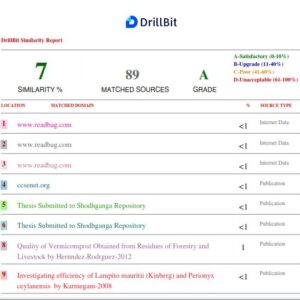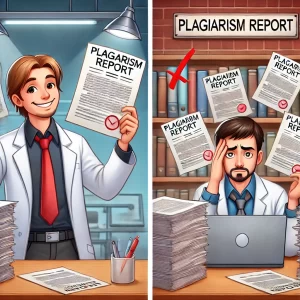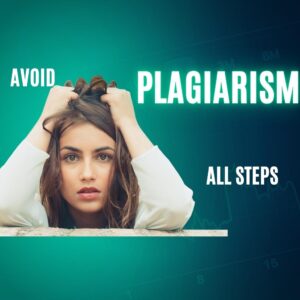
What Happens When You Don’t Check for Plagiarism?
Consequences and Suggestions
In today’s world of immediate access to information, it’s simpler than ever to unintentionally commit plagiarism. Neglecting to verify for plagiarism prior to submitting academic or professional work can lead to significant consequences, including academic penalties, damage to reputation, and potential legal issues. By understanding these risks and implementing measures to prevent plagiarism, you can safeguard your work and uphold integrity. Here’s what can occur when plagiarism is not addressed and the strategies to prevent these problems.
Consequences of Unchecked Plagiarism
1. Academic Penalities
In educational environments, plagiarism is regarded as a significant violation of academic integrity. Many educational institutions enforce rigorous policies on plagiarism, and neglecting to verify it can lead to disciplinary measures. Depending on the severity, these penalties may range from failing the assignment and receiving a lower grade to academic probation, suspension, or even expulsion.
Example: A student submits a research paper that contains unintentional plagiarism. However, due to not running a plagiarism check, they encounter academic penalties that may harm their academic record.
Solution: Ensure you verify your work for plagiarism with trustworthy detection tools prior to submission. Grasping your institution’s plagiarism policies and mastering proper citation practices are essential initial steps in upholding academic integrity.
2. Damaged Reputation
In both academic and professional settings, having a reputation for honesty and reliability is crucial. Discovering plagiarism can result in a permanent mark on an individual’s reputation. When someone is caught plagiarizing, it can raise questions about their credibility and ethics among colleagues, mentors, and peers, potentially resulting in lost trust and damaged relationships.
Example: A researcher who publishes plagiarized content undermines their credibility in the field, which can hinder future collaborations with other professionals and make it challenging to obtain research funding.
Solution: Establish a solid reputation by dedicating yourself to originality in each project. Utilizing plagiarism detection tools, maintaining detailed records of all sources, and ensuring proper citations can assist you in preventing unintentional mistakes that may harm your reputation.
3. Professional Consequences
Plagiarism is not only a concern in academia; it is also an issue in the professional realm. In professions related to writing, research, or content creation, plagiarism can result in disciplinary measures, job termination, and restricted career prospects. Numerous employers maintain strict policies against plagiarism, as it negatively impacts the company’s values and integrity.
Example: An employee submits a report that includes sections taken from other sources without proper attribution. Upon discovery, the employee may face disciplinary action or termination due to ethical considerations.
Solution: Approach all professional tasks with the same care and attention as you would academic assignments. Even when facing time constraints, it’s important to prioritize originality and ensure proper attribution. Utilize approved plagiarism detection tools and resources to ensure that all work is thoroughly vetted.
4. Legal and Financial Repercussions
In certain situations, plagiarism may lead to legal and financial repercussions. Copyright infringement, which is a type of plagiarism, happens when an individual utilizes another person’s protected work without obtaining permission. This may result in legal actions and penalties, especially when it pertains to published content, creative works, or intellectual property.
Example: A freelance writer incorporates parts of a copyrighted article into their blog without obtaining permission. The original author has the option to pursue legal action, which could result in financial and legal consequences for the writer.
Solution: Get to know copyright laws and permissions, particularly when dealing with published materials. To utilize copyrighted material, obtain permission from the copyright holder or select items that are in the public domain or available for reuse under Creative Commons licensing.
5. Missed Learning Opportunities
Plagiarism prevents you from fully engaging with the material, restricting your understanding and capacity to critically analyze the topic. Copying without consideration can hinder your development of vital skills like critical thinking, synthesis, and analysis, which are crucial for both personal and academic advancement.
Example: A student who copies sections of an essay may succeed in passing the assignment, but they miss the opportunity to enhance their writing and analytical skills for future tasks, which can hinder their academic advancement.
Solution: Treat each assignment as a chance to learn. Focus on synthesizing ideas, analyzing information, and paraphrasing effectively rather than copying. This method enhances your abilities while allowing you to cultivate unique perspectives on the subject.
Some Suggestions to Avoid Plagiarism
1. Use Plagiarism Detection Tools
Tools like Drillbit, Turnitin, Grammarly, Quetext, and Copyscape can help you identify potentially plagiarized content before submitting your work. These tools highlight similar phrases and sections, allowing you to review, revise, or add proper citations.
Efffective Utilization: Run your work through a plagiarism checker after completing your final draft. Review flagged sections carefully to determine whether they need rephrasing, citation, or removal.
2. Practice Proper Citation and Referencing
Learning the rules of citation and applying them consistently is essential to avoid plagiarism. Different academic and professional organizations use different citation styles, so familiarize yourself with the style your field requires, such as APA, MLA, or Chicago.
Efffective Utilization: When researching, keep track of every source you consult, including page numbers and publication details. Use citation management tools like Zotero or EndNote to organize sources, generate accurate citations, and ensure consistency.
3. Develop Effective Note-Taking Skills
Poor note-taking can lead to plagiarism when you mistakenly use information from your notes without citing the original source. By taking clear and organized notes, you can easily distinguish between your own ideas and those sourced from others.
Efffective Utilization: Separate direct quotes from your own ideas in your notes. Use color coding, highlighters, or symbols to mark sections that need citations, and always include complete source details with each note.
4. Learn Paraphrasing and Summarizing Techniques
Paraphrasing is a valuable skill that allows you to use information from a source while presenting it in your own words. Effective paraphrasing involves rewriting ideas thoroughly without mimicking the original structure or wording.
Efffective Utilization: Read a section of text, understand the concept the author wants to describe and then rewrite the idea from memory in your own language and style. Follow up with a citation to credit the original source. Practice summarizing ideas to get better at expressing complex concepts concisely.
5. Allocate Enough Time for Research and Writing
Last-minute pressure is one of the biggest contributors to plagiarism, as students and professionals may resort to shortcuts when they’re racing against the clock. Giving yourself enough time to research, write, and review your work can prevent the temptation to copy and paste.
Efffective Utilization: Break down each project into manageable tasks and set realistic deadlines. Time management tools, such as planners or productivity apps, can help you stay organized, allowing you to work methodically and with integrity.
6. Use Collaborative Tools for Group Work
In group projects, plagiarism can sometimes occur when tasks aren’t clearly divided or when sources are mixed up. Collaborative tools, such as Google Docs, Microsoft Teams, or Trello, allow teams to work together transparently and ensure accountability.
Efffective Utilization: Use shared documents to track contributions and sources. Assign clear roles and encourage team members to check each other’s work for citations and originality.
Conclusion
Unchecked plagiarism can lead to serious academic, professional, and personal consequences, from damaged reputations to legal risks. However, these risks are preventable with the right tools and habits. By using plagiarism detection tools, practicing proper citation, developing good note-taking and paraphrasing skills, and managing your time effectively, you can avoid the pitfalls of plagiarism. Prioritizing integrity in your work not only protects your reputation but also fosters a deeper understanding of your field, building a foundation for long-term success and credibility.


